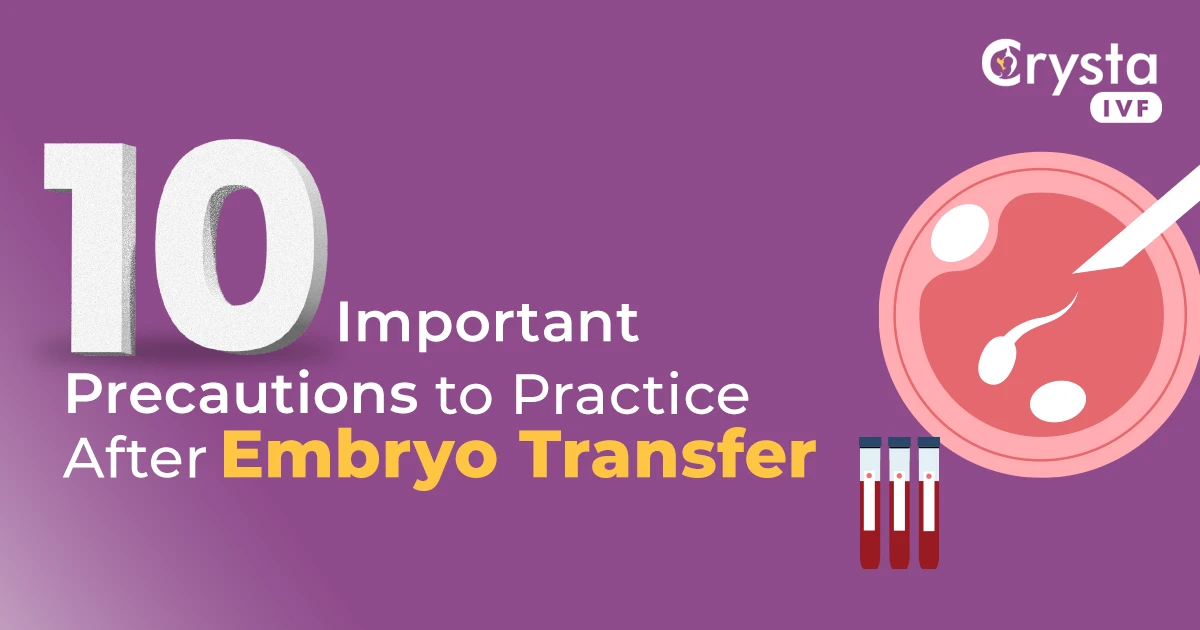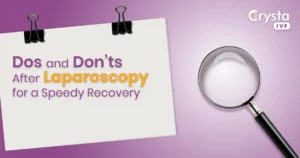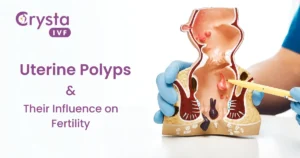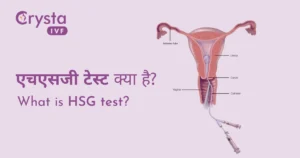Mrs. Akriti successfully conceived after struggling with infertility for 3 years. You might wonder why it took so long for her to achieve this milestone. The reason is that she avoided certain crucial steps after her embryo transfer.
Remember, every small mistake can lead to serious issues. Therefore, mothers need to take every necessary precaution to ensure IVF success. Here are some important lifestyle changes and precautions after embryo transfer, which Mrs. Akriti initially overlooked.
Embryo transfer is considered the last step of the IVF process. The ability of the embryos to implant in the uterus will determine whether or not the IVF is successful. It takes two weeks for the mother to know if she is pregnant. However, the process of transferring embryos to a woman’s uterus to conceive is known as Embryo Transfer.
10 Precautions to Take After Embryo Transfer
Generally, the embryo transfer is done after 3 or 5 days of fertilization. The IVF specialist decides the day when the transfer must be done. It depends on several factors, such as the divisions of cells, the number of healthy embryos, the mother’s health condition, and the uterine wall. After the embryo transfer, the mothers must follow certain lifestyle modifications and precautions for a successful transplant.
- Refrain from stress & anxiety.
- Consume a balanced & healthful diet.
- Steer clear of intense physical activity
- Avoid any sexual activity
- Don’t ignore any serious symptoms
- Avoid consuming harmful chemicals
“Every couple’s journey is unique. Providing personalized precautions tailored to their specific circumstances makes us different.”
#1 Take Proper Bed Rest
Doctors recommend resting completely and staying in bed immediately after the embryo transfer. Generally, it takes six to ten days for a 3-day embryo transfer and some fewer days for a 5-day embryo transfer.
- Take a vacation during the transfer week.
- Take sufficient sleep and take care of your body.
- Slowly start going back to your regular activities.
- Do not do anything that is physically demanding.
#2 A Healthy Diet is a Must!
The time following embryo transfer is an excellent opportunity to start eating healthy during pregnancy. A balanced diet after embryo transfer is the key to maintaining a healthy weight.
- Have a variety of fresh, leafy green vegetables and fruits
- Take a protein, calcium, and iron-enriched diet
- Vitamins and Minerals are the best for embryo growth
- Consume adequate water to keep your body cells hydrated
Also, consult with your fertility specialist before consuming any products or supplements.
#3 Follow Your Doctor’s Advice & Medicines
After embryo transfer, take some time to rest and refrain from doing anything that is physically demanding. Your IVF specialist may advise you to relax completely after embryo transfer, stop practicing any outdoor games for a while, drink plenty of water, use a lift instead of stairs, and avoid having intercourse.
#4 Avoid Vigorous Exercises for 2 Weeks
After embryo transfer, you should refrain from engaging in any physically taxing activities as they may harm your physical and mental health. Some IVF safety measures must be followed by the mothers when engaging in physical activity.
- Refrain from bending, jumping, running, jogging, swimming, and moving heavy objects
- Avoid going to the Gym or Zumba for 2 weeks
- Practice Yoga or simple exercises to stay fit
#5 Say No to Sexual Intercourse
One of the many safety measures that need to be followed after embryo transfer is to refrain from sexual activity. A “pelvic rest” is necessary for your reproductive system as an embryo is currently developing there.
Do not have sexual relations for at least two weeks following the embryo transfer. The uterus is stressed during sexual activity, which causes it to contract continuously. These contractions disrupt the developing embryo in the uterus and disturb the implantation.
#6 Do Not Ignore any Symptoms
Some mothers might undergo long-term hormone therapy, which results in Ovarian Hyperstimulation Syndrome (OHSS). In OHSS, the ovaries become uncomfortable and inflamed, resulting in mild to severe symptoms. Consult your doctor immediately if you experience any of the following symptoms after embryo transfer:
- Vomiting and Nausea
- Severe Stomach Ache
- Diarrhea
- Bloating
These symptoms are usually not severe, but they should not be ignored. Ignoring these signs can exacerbate the condition and lead to more problems.
#7 A Big No to Pregnancy Tests
Pregnancy tests should not be taken at home! A false-positive or false-negative result could result from an early pregnancy test. After the transfer, you should wait around two weeks before taking your first pregnancy test.
Schedule your official pregnancy test with the doctors to avoid any hustle in the future.
#8 Stress & Anxiety? Avoid Them!
We understand that the whole IVF process can cause anxiety and stress. But staying positive this time is crucial for your developing baby. Listen to music, go out for a walk, talk to friends, and discuss with your partner to avoid stress and anxiety.
#9 Keep Away from Heat and Harmful Chemicals
The secret is to keep your body at a proper temperature. According to several studies, body temperature can rise during IVF. Consult your doctor immediately if your temperature rises above 102 or 103 degrees Fahrenheit. It can interfere with embryo implantation, the release of pregnancy hormones, and the growth of the fetus.
Also, refrain from using hot tubs or steam rooms or consuming hot meals that can raise body temperature.
#10 Take Folic Acid Supplements
Folic acid supplements are essential for the fetus’s brain development and prevent neural tube abnormalities during pregnancy. IVF specialists recommend a daily dose of 400 micrograms or more of vitamin B9 to women to avoid abnormalities in their fetuses.
Positive Signs After Emrbyo Transfer
We understand that it can be distressing to question the meaning of every emotion. But doctors at Crysta IVF are available for you to answer all your questions related to IVF. Every mother may experience different symptoms that indicate various meanings. However, some common positive signs experienced by the mothers are:
- Breast Tenderness
- Fatigue
- Nausea
- Missed Periods
- Cramps and Bloating
- Vaginal Discharge
- Increased Basal Body Temperature
- Light Bleeding or Spotting
Take Away
There’s a lot of hope and expectation after embryo transfer. This is when all precautions and attention to detail could be worthwhile. These safety precautions are integral to your goals of becoming a parent and serve as the basis of your future.
If you face any problems or have any doubts regarding embryo transfer, you must immediately connect with an IVF specialist at Crysta IVF. We practice 100% transparency and help parents fulfill their dream of parenthood. Book a FREE consultation and start your journey, too.
Meanwhile, Stay Fit and Stay Healthy!
Frequently Asked Questions
How can I improve my success after embryo transfer?
To improve your success after embryo transfer, you must get enough rest, eat a balanced diet, avoid stress, stay hydrated, and follow all medication and instructions from your fertility specialist.
What not to do after embryo transfer?
Avoid heavy lifting, intense exercise, smoking, alcohol, junk food, long travel, and skipping medications. Also, doctors recommend avoiding hot baths or saunas.
How long to rest after embryo transfer?
Take proper rest for about 24 hours after the procedure. However, you must take a week off from your work and try doing light activity, but avoid strenuous work for a few days.
Can I do household work after embryo transfer?
Yes, you can do household work after embryo transfer but doctors recommend performing only light household work and avoiding any heavy chores that involve bending, lifting, or overexertion.
Is walking ok after embryo transfer?
Yes, slow and gentle walking is completely safe and can even support blood circulation, which is helpful.
Which food is not good after embryo transfer?
Avoid consuming processed foods, raw or undercooked meat and eggs, high-sugar snacks, caffeine, and spicy or oily food that may cause bloating.
Is sitting ok after embryo transfer?
Yes, sitting is absolutely fine. Just avoid sitting for too long without movement; take gentle walks or stretch every now and then to maintain blood circulation.
Can I travel after an embryo transfer?
No, you cannot travel for long journeys until there is an emergency. Short local travel is usually safe after a day or two of rest. However, long-distance or bumpy travel should be avoided in the first few days unless your doctor says it’s okay.
How to stay positive after embryo transfer?
To stay positive after embryo transfer, practice mindfulness, talk to supportive friends or family, focus on things you enjoy, and avoid overthinking or stressing over symptoms.
What can ruin an embryo transfer?
Your poor lifestyle choices, not following medication, high stress levels, or underlying health conditions not managed properly, can affect the success of the embryo transfer.
What are the rules after embryo transfer?
The only rule after embryo transfer is:
- Rest for 24 hours
- Avoid heavy physical activity
- Take prescribed medications
- Eat healthy & stay hydrated
- Avoid smoking, alcohol, and stress
- Stay in touch with your doctor




